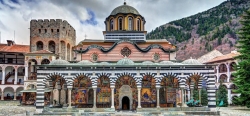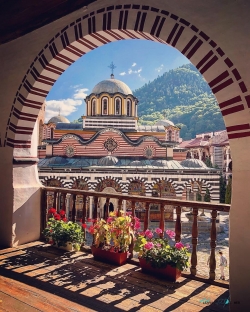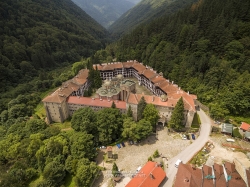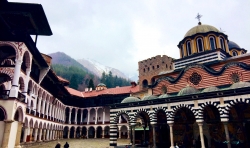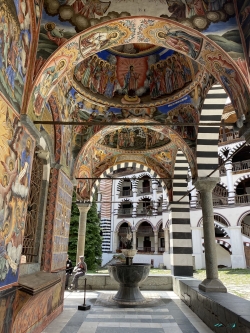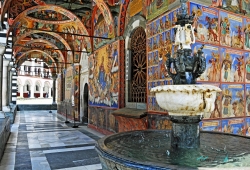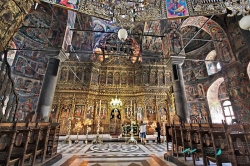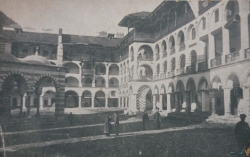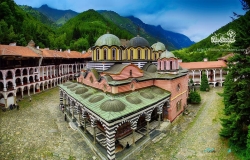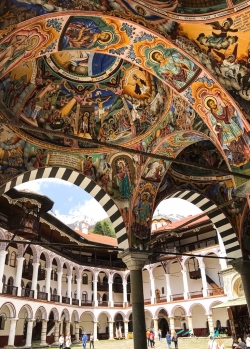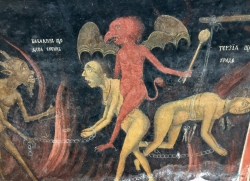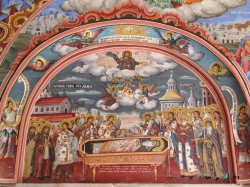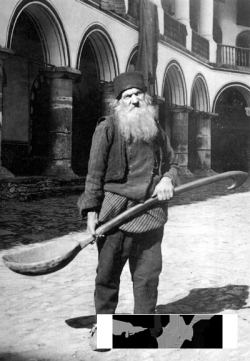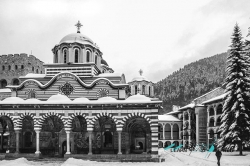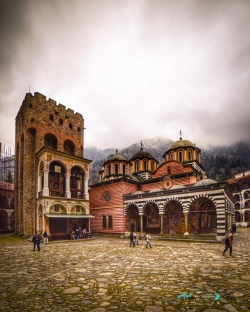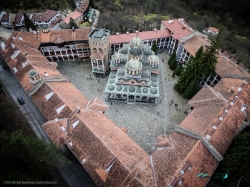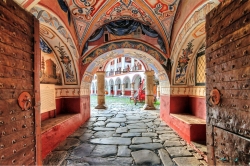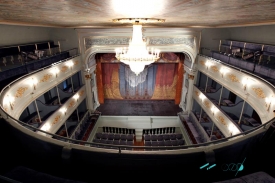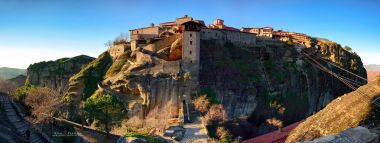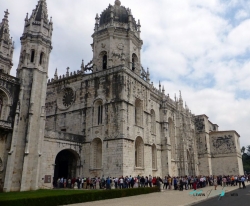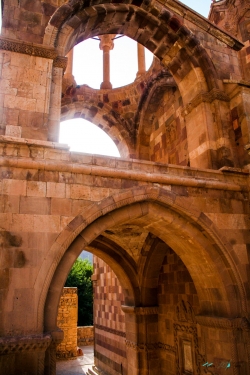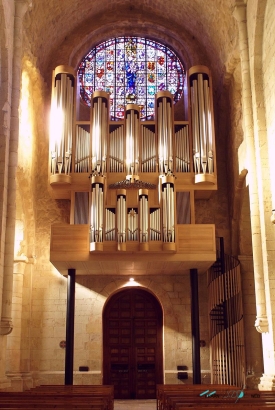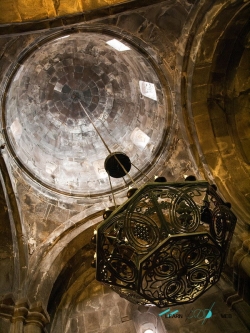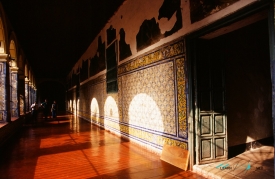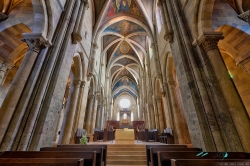ABOUT Rila Monastery
The Rila Monastery “St. Ivan Rilski” stands as a Bulgarian stauropegial monastery and one of the most significant cultural monuments in Bulgaria. As a symbol of the country, it proudly holds a place on the UNESCO World Heritage List.
Nestled in southwestern Bulgaria, within the Kyustendil district and Rila municipality, the monastery was founded in the 10th century by St. John of Rila the Wonderworker, along the upper reaches of the Rila River. The current monastery is situated near the village of Pastra, close to its original location, alongside the Rila River. Notably, it is the largest monastery in Bulgaria, boasting five floors, four of which are visible due to restrictions imposed by the Ottoman government in 1834 when the current buildings were constructed. The ground floor houses the monastery’s museum.
Tsar Ivan Shishman granted the Rila Monastery a charter on September 21, 1378, signed and sealed with a gold seal, which endowed the monastery with 20 villages and their lands as feudal estates. By 1402, the Ottoman authorities reaffirmed the monastery's pre-existing rights, and a tax register from 1520-1521 documented 21 monks residing there. In 1469, with the assistance of Mara Brankovic, the relics of St. John of Rila were returned to the monastery from Tarnovo.
Since its inception, the Rila Monastery has been a center for literature and education. During the Bulgarian National Revival, Neofit Rilski played a pivotal role in founding a cell school within the monastery. It also provided refuge for notable Bulgarian revolutionaries such as Vasil Levski, Ilio Voivoda, Gotse Delchev, and Peyo Yavorov.
Despite suffering from a wildfire in 1778, the monastery was rebuilt in 1784 by Alexi Rilets, who later designed and constructed the east, north, and west wings between 1816 and 1819. Following another devastating fire in 1833, restoration efforts were again led by Alexi under Abbot Joseph the Builder. In 1840, a new iconostasis was created for the church by Petar Filipov, Anton Stanishev, and Dimitar Stanishev.
The Rila Monastery, not only serves as a place of worship and historical interest but also offers accommodation for pilgrims and tourists. This unique opportunity allows visitors to immerse themselves in the tranquil and sacred atmosphere of the monastery.
The Rila Monastery “St. Ivan Rilski” is not only a monumental religious site but also a testament to Bulgaria’s rich historical and cultural heritage. It continues to draw visitors and pilgrims alike, offering a glimpse into the spiritual and architectural grandeur of Bulgaria’s past.
Nestled in southwestern Bulgaria, within the Kyustendil district and Rila municipality, the monastery was founded in the 10th century by St. John of Rila the Wonderworker, along the upper reaches of the Rila River. The current monastery is situated near the village of Pastra, close to its original location, alongside the Rila River. Notably, it is the largest monastery in Bulgaria, boasting five floors, four of which are visible due to restrictions imposed by the Ottoman government in 1834 when the current buildings were constructed. The ground floor houses the monastery’s museum.
Architectural Marvels
The initial monastery "St. John of Rila" was established between 927 and 941 by St. John of Rila the Wonderworker, or according to some sources, by his disciples, in the Rila Mountains. In 1335, a defensive tower and a small one-nave church were added to the courtyard of today's monastery by the local feudal lord Protosevast Hrelio. The tower remains the oldest preserved building in the monastery complex, with the chapel "Holy Transfiguration" at its top, featuring invaluable frescoes from the 14th century.Tsar Ivan Shishman granted the Rila Monastery a charter on September 21, 1378, signed and sealed with a gold seal, which endowed the monastery with 20 villages and their lands as feudal estates. By 1402, the Ottoman authorities reaffirmed the monastery's pre-existing rights, and a tax register from 1520-1521 documented 21 monks residing there. In 1469, with the assistance of Mara Brankovic, the relics of St. John of Rila were returned to the monastery from Tarnovo.
Since its inception, the Rila Monastery has been a center for literature and education. During the Bulgarian National Revival, Neofit Rilski played a pivotal role in founding a cell school within the monastery. It also provided refuge for notable Bulgarian revolutionaries such as Vasil Levski, Ilio Voivoda, Gotse Delchev, and Peyo Yavorov.
Despite suffering from a wildfire in 1778, the monastery was rebuilt in 1784 by Alexi Rilets, who later designed and constructed the east, north, and west wings between 1816 and 1819. Following another devastating fire in 1833, restoration efforts were again led by Alexi under Abbot Joseph the Builder. In 1840, a new iconostasis was created for the church by Petar Filipov, Anton Stanishev, and Dimitar Stanishev.
Modern-Day Monastery
By 1862, American missionaries reported 350 monks living in the monastery, with 400 guests during Easter. Today, the Rila Monastery complex spans an area of 8800 square meters, with 5500 square meters of built-up space. The monastery wings, constructed at various times on the 4th and 5th floors, enclose the sole courtyard, which is irregularly pentagonal in shape.The Rila Monastery, not only serves as a place of worship and historical interest but also offers accommodation for pilgrims and tourists. This unique opportunity allows visitors to immerse themselves in the tranquil and sacred atmosphere of the monastery.
The Rila Monastery “St. Ivan Rilski” is not only a monumental religious site but also a testament to Bulgaria’s rich historical and cultural heritage. It continues to draw visitors and pilgrims alike, offering a glimpse into the spiritual and architectural grandeur of Bulgaria’s past.
The Best Pictures of Rila Monastery
Videos of Rila Monastery









